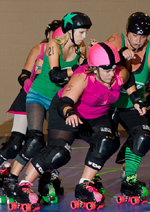|
|
|

|
Roller derby requires mix of brains, brawn
|
By Patrick McHugh
Business
Development and Marketing Services
Roller derby isn’t just about women in short skirts and fishnet
stockings. It’s a serious sport that demands athleticism, teamwork and
an analytical approach from team members—at least that’s what eight
MUSC employees have found.
Playing with the Charleston team called the Lowcountry Highrollers, the
employees are enjoying a sport that was last popular in the 1970s, but
is back bigger than ever, with more than 17,000 skaters worldwide.
 Marie Lockhart and
Jennifer Bushee make a wall. Marie Lockhart and
Jennifer Bushee make a wall.
“We put on our boutfits when we go out to skate and they’re usually
pretty wild and fun, but there’s a lot of seriousness in our sport
behind that,” said Annie “Dame Right” Simpson, a faculty research
associate in the Department of Medicine. “We don’t want to be known as
a weird subculture, but as real athletes playing a real sport.”
And despite the skaters’ often mock-violent derby aliases and the fact
that injuries are common, it’s not just about roughing up other players.
Adair “Adair-Ya To” Dempsey Olsen, a research specialist in the
Division of Nephrology said she thought in the beginning the sport was
just about skating around and hitting people. “But then you realize
there is a lot of strategy and thinking. Figuring out plays is a lot
like solving scientific problems.”
Monica “Jungle Jane” Davis, a researcher in the Department of Cell
Biology and Anatomy, agreed. “It’s beauty, brains and brawn all
in one,” Davis said. “The derby mentality is very similar to
research—you have to be very analytic when developing and making
plays.”
 Jennifer Bushee
takes out two blockers. Jennifer Bushee
takes out two blockers.
Jennifer “Boo Boo” Bushee from the Central Verification Unit said team
members work well together despite being from such different
backgrounds. “I’ve made friends I never would have otherwise, and it’s
a real confidence booster to know that you can work successfully with
people from such different backgrounds.”
Nora “Vinyl Wrecker” Van Leuvan brings that sense of teamwork to her
job purchasing supplies for the research department at the Storm Eye
Institute. “Everyone is so focused on research and someone has to get
the supplies they need to carry on their work. So I function like the
blocker does for the jammer in derby—getting problems out of the way so
she can score.”
Olsen, who finds the sport to be a great stress reliever, said it’s a
good way to meet other women and get out some aggression. One of the
first skills the players have to learn is how to fall, which is scary,
she said. “But they also teach you how to get back up and keep skating.
If you can jump over someone on skates, what else can you do?”
Research pharmacist Kim “Catty Colamean” Porter agrees, as her derby
name shows—catecholamines are the “fight-or-flight” hormones released
by the adrenal glands in response to stress.
Adds Simpson: “When you’re playing roller derby there is no time to
think about anything else so it’s truly a break, which is great when
you have stressful jobs like ours. It brings a lot of value to anyone’s
work when you have something outside of work that brings you meaning. A
lot of times your world closes in and all you do is go to work, go
home, make dinner, go to bed and then do it all again the next day.
What all of us collectively have done is go out and bring something
else into our lives.”
And they did it all themselves. The return of roller derby has been a
grassroots, do-it-yourself project by the teams, and the Lowcountry
Highrollers are no exception. They pay to play, set up the team as a
non-profit and run everything themselves, from scheduling bouts with
other teams to reserving the venue to laying the special floor they
skate on.
But they don’t do it just for themselves: Giving back to the community
is important to them so they sponsor a different charity at each bout
and arrange other fundraisers throughout the year, like last weekend’s
Rolling of the Bulls on Folly Beach, which raised money for the Folly
Beach Relief Fund and the Folly Beach Chapter of Surfers
Healing.
Simpson said she feels the same way about roller derby that she does
about being part of MUSC. “Both are working to make a positive
contribution to the community.”
Porter likes it that MUSC Sports Medicine sponsors their team. “MUSC
has high standards and I love that they’re endorsing our team. Seeing
how well injured skaters are treated here makes me proud to work at
MUSC.”
Marie “Attackagawea” Lockhart, a Ph.D. candidate in the College of
Graduate Studies, knows that first-hand. “Dr. Geier did a great job on
my ACL surgery and Renee Garrison not only designed the team’s
stretching routine, she was the physical therapist that got me back to
skating.” University Hospital OR nurse Sarah Voges comes to every
single game to take care of the team. “She’s really awesome and
dedicated.”
Next Game Time
Come support the
Lowcountry Highrollers next bout Sept. 26, at The Citadel’s McAlister
Fieldhouse. Doors open at 4 p.m. and the bout starts at 5 p.m. Tickets
are $10 in advance and $12 at the door. Children 10 and under get in
free. For information, see http://www.lowcountryhighrollers.com.
Friday, Sept. 24, 2010
|
|
|




